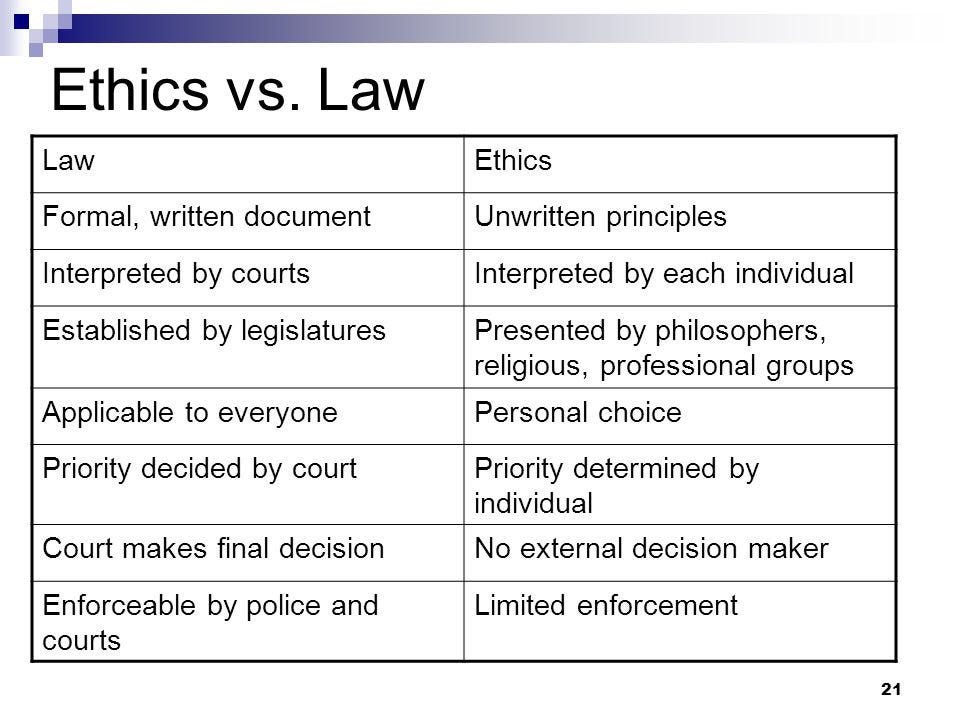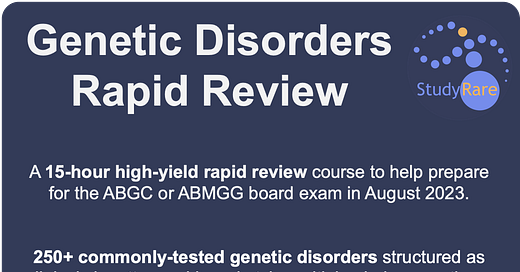Hello,
This week is the second in a 3-part series on ethics, which are part of both ABMGG and ABGC board exams. Ethical issues often intersect with legal issues, and the latter will be the focus of this post.
📢 I am also very excited to announce the 15-hour Genetic Disorders Rapid Review Course from Mon July 17 - Wed July 26 for those taking the ABGC or ABMGG board exams in August. We will be focused on commonly-tested genetic disorders. Sign up here!
At the end of this email, I have shared links to 3 different prenatal GC jobs that have been recently posted.
Please feel free to email with any comments or questions about this post (daniel@studyrare.com) and to share this post with anyone who might find it useful!
-Daniel
Questions
Question 52
A 24-year-old recruit who is planning to enter the US Air Force presents with a family history of early cardiac death. She previously had a genetic test performed that showed a variant of uncertain significance (VUS) in SCN5A. Her health records, which include these genetic test results, are shared as part of her application. Based on this genetic test result, the military deems her ineligible to serve as a pilot. Which of the following best describes the military's actions toward this recruit based on the genetic test results?
GINA = Genetic Information Nondiscrimination Act; HIPPA = Health Insurance Portability and Accountability Act; ADA = Americans with Disabilities Act
Question 53
After hearing the news, the recruit in Question 52 decides instead to apply for a job as a cashier at a small local supermarket, where she would be the 9th employee. During the interview, the hiring manager asks about her family history and if she has had any genetic testing before. Though this makes her uncomfortable, she answers the question truthfully, as she fears that not doing so would affect her chances of getting the job. She is subsequently denied the job, despite being well-qualified. Which of the following describes the hiring manager’s line of questioning during the interview?
GINA = Genetic Information Nondiscrimination Act; ACA = Affordable Care Act; ADA = Americans with Disabilities Act
Explanation
Q52: A lawful exception under GINA
Q53: A lawful exception under GINA
In both of these scenarios, the individual experiences discrimination on the basis of her genetic background. In both cases, the discrimination experienced by the individual does not violate the law, as both the military and small employers are listed as exceptions under Genetic Information Nondiscrimination Act (GINA). However, the question of whether the employer’s actions are ethical, or morally ‘right,’ is debatable, particularly for the situation in Question 53.

What is GINA?
GINA protects people from the misuse of genetic information by health insurance and employers. GINA was passed as a federal law in the United Stated in 2008 in response to ethical concerns surrounding genetic discrimination in health insurance and employment. GINA is particularly important for patients who are asymptomatic and who have a genetic test result that increases the likelihood of developing a future medical condition, as was the case with the patient in these two questions. This law was also designed to allow patients to pursue medically-indicated genetic testing without fear that it would affect their health insurance eligibility or premiums.
But first: why would anyone choose to discriminate against someone with a genetic condition? For one, health insurers and employers may fear the high medical costs incurred by someone with a genetic predisposition or genetic condition. For example, a health insurer might want to raise the monthly premium for a patient who carries a pathogenic BRCA1 or BRCA2 variant, given that they are at higher risk for expensive medical complications like cancer. Employers might discriminate against employees based on genetic background because of fear of high health insurance costs (which are often borne by employers as part of self-insured plans) or because of a fear of frequent job absences due to illness or the need to attend medical appointments. We will explore the protections offered by GINA as it relates to both health insurance and employers in the following paragraphs.
Health insurance
Currently, health insurers in the U.S. vary health insurance premiums based on age (older people pay higher premiums because they typically need more medical care), geographic location, tobacco use (smokers pay more), family size, and income. Under GINA, health insurers cannot use a person’s genetic information or family history to determine eligibility for insurance plans, set or raise insurance premiums, or request that a person undergo a genetic test as part of obtaining an insurance policy. Insurers also cannot request previously completed genetic test results from people seeking a health insurance place. Of note, GINA applies to both private (e.g. United, Cigna) and public (eg Medicare, Medicaid) health insurers but not TRICARE (health insurance plan for the U.S. Military).
Employers
Under GINA, employers with more than 15 employees are prohibited from using genetic information in employment decisions such as hiring, firing, promotions, pay, and job assignments. GINA also prohibits employers from requesting or requiring genetic information about employees or their family members. If the employer in Question 53 had more than 15 employees, then their discriminatory line of questioning would not have been allowed under GINA.
An employee (or potential employee) who believes that an employer has violated GINA may report this to the Equal Employment Opportunity Commission (EEOC). The EEOC then will notify the employer of the charge and attempt to settle or resolve the dispute. If the dispute is not resolved voluntarily, EEOC will investigate and either notify the person of his or her right to file a lawsuit or file a lawsuit on the person's behalf. Of note, EEOC has received over 700 charges related to GINA violations between 2010-2022.
Exceptions to GINA
There are three important exceptions to GINA. First, GINA does not apply to other types of insurance beside life insurance, including life insurance, disability insurance, or long-term care insurance. Therefore, patients may want to enroll in these types of insurances prior to undergoing genetic testing to avoid the possibility of discrimination based on future genetic test results. Of note, some states (e.g. Alabama, Arizona) have state laws that offer additional protections against genetic discrimination in other types of insurance. Second, GINA does not apply to employers with fewer than 15 employees. This exemption leaves employees of small businesses vulnerable to genetic discrimination, as in Question 53. Third, GINA does not apply to members of or prospective applicants to the U.S. military. As was the case in Question 52, the U.S. military, along with other exempted organizations, may also make employment and assignment decisions based on variants of uncertain significance (VUS).
Incorrect answers
The Affordable Care Act (ACA; passed in 2010) prevents health insurance companies from adjusting premiums or making coverage decisions based on pre-existing conditions. The ACA also increased access to health insurance by establishing the Health Insurance Marketplace and by expanding Medicaid eligibility in many states to provide coverage to more low-income individuals. The Americans with Disabilities Act (passed in 1990) prevents employers with 15 or more employees from discriminating against qualified individuals with disabilities in all aspects of employment, including hiring, promotions, job assignments, and termination. It also requires employers to provide reasonable accommodations to enable individuals with disabilities to perform essential job functions. The Health Insurance Portability and Accountability Act (HIPPA; 1996) is a federal law that establishes standards for the privacy and security of protected health information (PHI). It applies to covered entities such as healthcare providers, health plans, and healthcare clearinghouses, requiring them to safeguard individuals’ health information and providing individuals with rights over their own PHI.
Learning objective
Genetic discrimination based on an individual's genetic test results has the potential to occur in a variety of settings including employment and when obtaining health insurance. The Genetic Information Nondiscrimination Act (GINA) prohibits discrimination based on genetic information by health insurance companies and employers, who together pay for a significant portion of healthcare in the United States. GINA does not apply to other types of insurance (besides health insurance), employers with fewer than 15 employees, and the military.
2023 ABMGG General Exam Blueprint | X. Genetic Counseling → b) Legal issues & c) Ethical issues (page 5)
2023 ABGC Exam Content Outline | Domain 5. Financial/Reimbursement Issues, Resources and Services for Clients, Legal and Regulatory Requirements, and Professional Frameworks → C. Legal and Regulatory Requirements
References
The ethics of genetic testing and screening in the military (2021)
GINA case studies (JAX labs)
Jobs
There is a prenatal GC position in Fairfax, Virginia, a prenatal and cancer GC position in Detroit, and a prenatal GC position in Houston. Feel free to send any job opportunities to me, and I will share them in the next newsletter!




